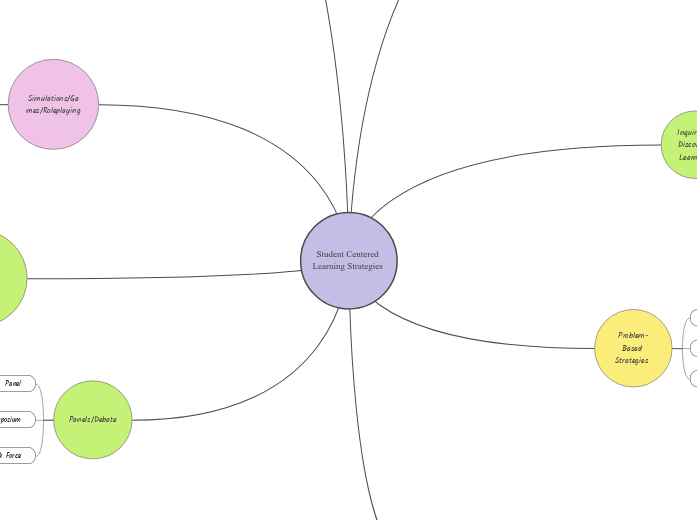Student Centered Learning Strategies
Concept Attainment Approach
Comparisons
Identifying similarities and differences between concepts
Classifications
Grouping ideas or concepts together based on similar characteristics or ideas
Metaphors
A figure of speech use to make an implicit comparison or connection between two unlike things (ex. Jackson was a rock to Betty)
Analogies
A comparison between two similar things that can be used to explain something or make it easier to understand (ex. A Galaxy is Stars as a Beach is to Sand)
Inquiry & Discovery Learning
Inquiry
Open-ended and creative way to seek knowledge
Constructivists Approach
Constructing meaning out of information through active engagement and understanding
Guided Inquiry
Teacher provides the data and then questions the students so they may come to a conclusion
Unguided Inquiry
Commonly individual inquiry; Students take control of data gathering and questioning
Problem-Based Strategies
Projects
An activity that involves investigation about the facts of a certain issue and reporting the facts
Reports
Similar to projects, but mostly centered around gathering data and facts
Problems
An issue that must be resolve through inquiry, investigation, solution, etc.
Discussions
Whole Class Discussions
Involves all students in the class engaging in conversation with one another while being guided by the teacher
Small Group Discussion
Similar to whole class discussions, but focus on allowing students to discuss ideas/concepts in a smaller more focused group.
Cooperative Learning
Informative Talk
Low Student Engagement
Ideal for knowledge acquisition
Providing simple, basic information
Including (activities, discussion, engagement, etc.) increases effectiveness
Informal Groups
Temporary groups for quick conversation (ex. turn and talks)
Formal Groups
Carefully designed/organized groups of students to allow maximum efficiency and learning
Base Groups
Long-term grouping of students that can be used throughout a whole term to further synthesize learning among students
Simulations/Games/Roleplaying
Role Playing
A student-directed activity in which students act out or dramatize a particular situation, circumstance, or idea
Simulations
Exercises that model real-life environments and situations
Games
Designed to involved students in competition as a primary means to achieve a learning goal
Independent Approaches
Learning Centers or Stations
A designated place within the room where a student goes to pursue either required or optional activities on a given topic
Independent Work or Learning Contracts
Refers to an assignment or activity that students complete without the direct involvement of the teacher or other students
Panels/Debate
Panel
Fairly informal setting with a group of 4-6 people discuss a topic with a moderator
Symposium
More formal version of a panel in which each member gives a form of presentation related to the topic of discussion
Task Force
Again, similar to a panel, but requires thorough investigation of a topic with a formal presentation given to
